I’ve shared my very favorite vanilla cake recipe, which has received rave reviews. It’s an amazing recipe but makes a pretty big cake and feeds 24 people. What if you wanted to make a 6-inch cake??
Maybe you don’t need to feed a ton of people. Or maybe you want to make a smaller cake to create a certain look.
More often, people don’t have bigger pans. A lot of people start off with 6-inch cake pans, which may be the only size they have on hand. If that’s you, then today is your lucky day.
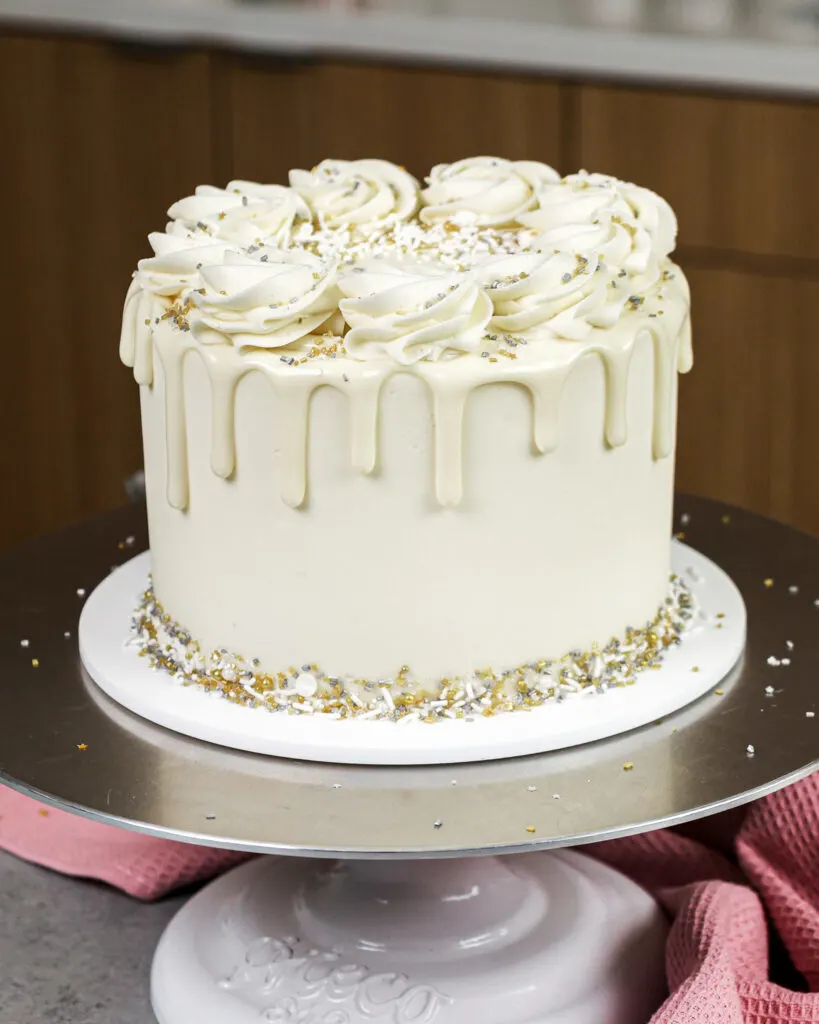
How Many Cake Layers Does This Recipe Make?
This small batch of my vanilla layer cake recipe bakes three, perfect little 6-inch cake layers. It may seem like you’re filling your pans pretty full, but this batter doesn’t rise much as it bakes.
That’s part of what makes my vanilla cake recipe so great though. It bakes flat, so leveling your cake layers is optional. With that in mind, you should end up with cake layers that are just a bit taller than 1 inch.
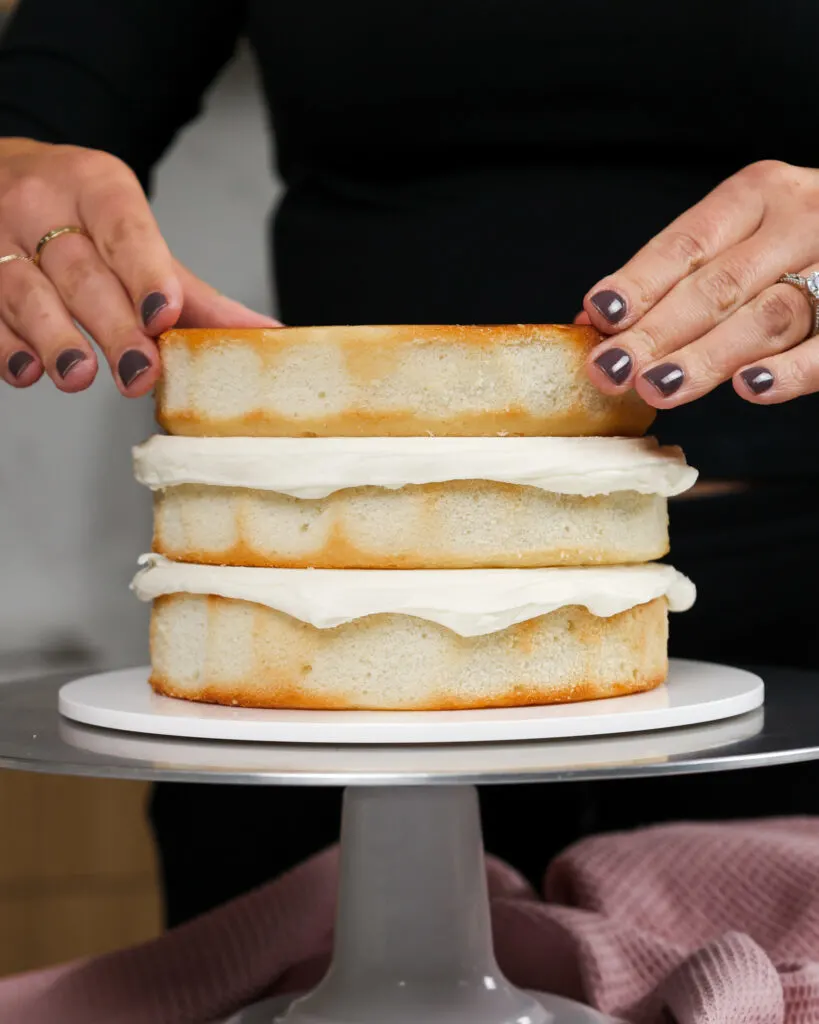
What Does Small Batch Mean?
In this case, “small batch vanilla cake recipe” just means I’ve updated the amount of ingredients you use to make this batter to make a smaller cake.
Initially I thought I could just cut the recipe in half and make three cake layers. You can do this, but the cake layers turn out quite a bit thinner than I’m used to.
I wanted each cake layer to be at least an inch tall, so I knew I’d have to play around the with ratios.
In the end, it turned out that making 2/3 of a batch is the ideal amount of batter for 6-inch cake layers.
I used this small vanilla cake recipe to make my hand painted floral cake. I wanted to create this design on a smaller cake, because I needed a smaller surface area.
It takes hours to layer the “paint” (a mixture of gel food coloring and vodka) on a cake like this, and I didn’t want to spend days painting a larger cake. I was so happy with how the cake turned out, and with its size!
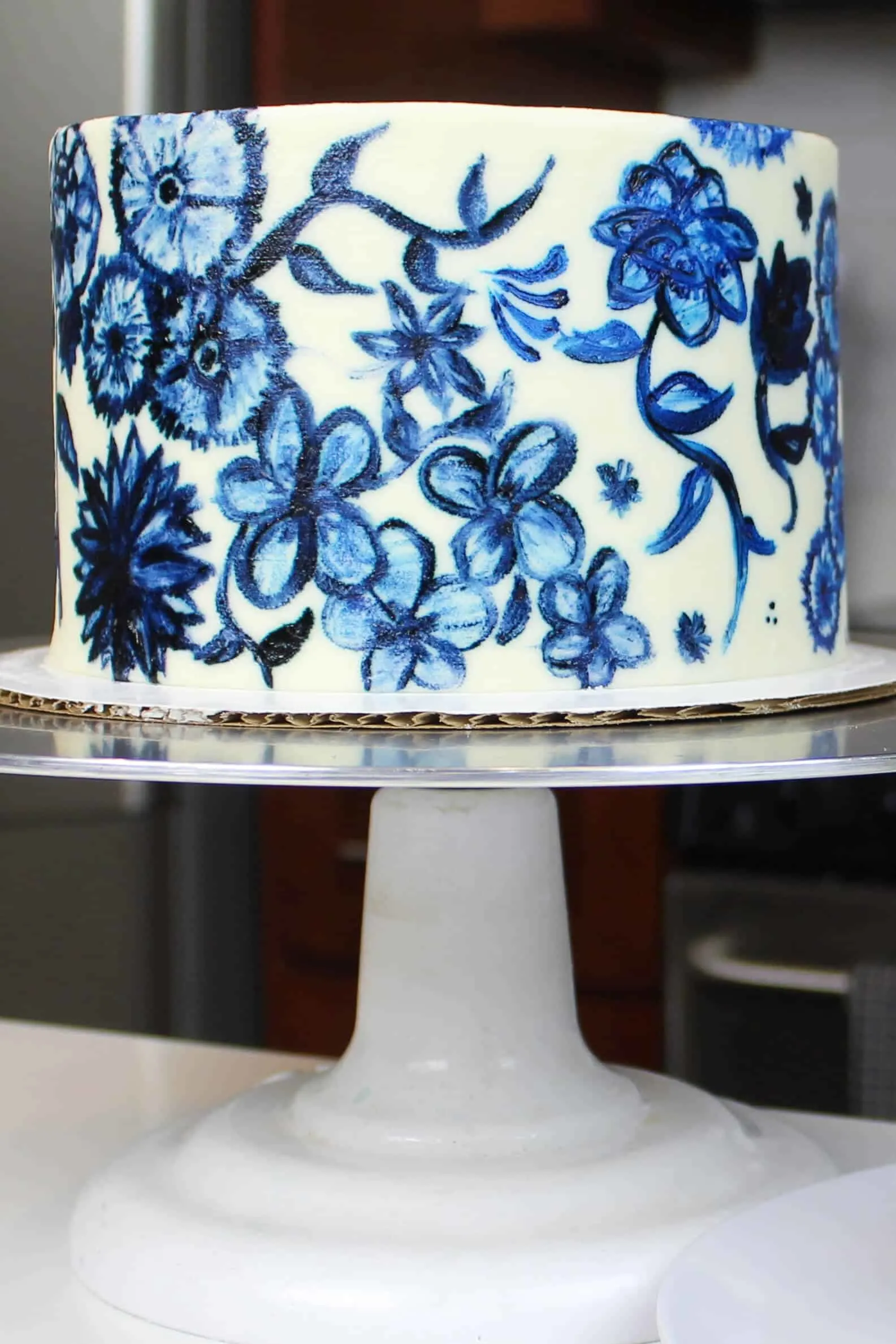
Substitutions and Swaps – Vanilla Cake Layers
This 6-inch vanilla cake recipe uses quite a few ingredients and I know you might not have all of them on hand. Or if you have food allergies or restrictions, I’ve got you covered.
Below are some swaps and substitutions that can be made in this cake recipe.
- All Purpose Flour – This recipe turns out best with AP flour, but you can use a gluten free flour blend or cake flour if that’s all you have on hand.
- Granulated Sugar – I do not recommend reducing the amount of sugar or changing the type of sugar, as it will change the texture of the cake layers.
- Unsalted Butter – If you only have salted butter on hand, you can use it in place of the unsalted butter in this recipe. Just be sure to omit the salt that this cake recipe calls for. You can also use vegan butter in its place (and also omit the salt)!
- Egg whites – I use egg whites out of a carton to avoid wasting any yolks! You can also use 5 egg whites or 3 whole eggs if needed. Or if you have an egg allergy you can use flaxseed eggs or an egg replacer.
- Buttermilk – You can also use full fat yogurt, sour cream, whole milk, or an alternative yogurt or milk (almond, soy, oat) if you’re dairy free.
- Vegetable Oil – You can use any flavorless oil in this recipe. Canola or even sunflower oil would work great!
- Vanilla Extract – Other extracts can also be used in place of the vanilla extract. Feel free to use almond, lemon, or even coconut extract.
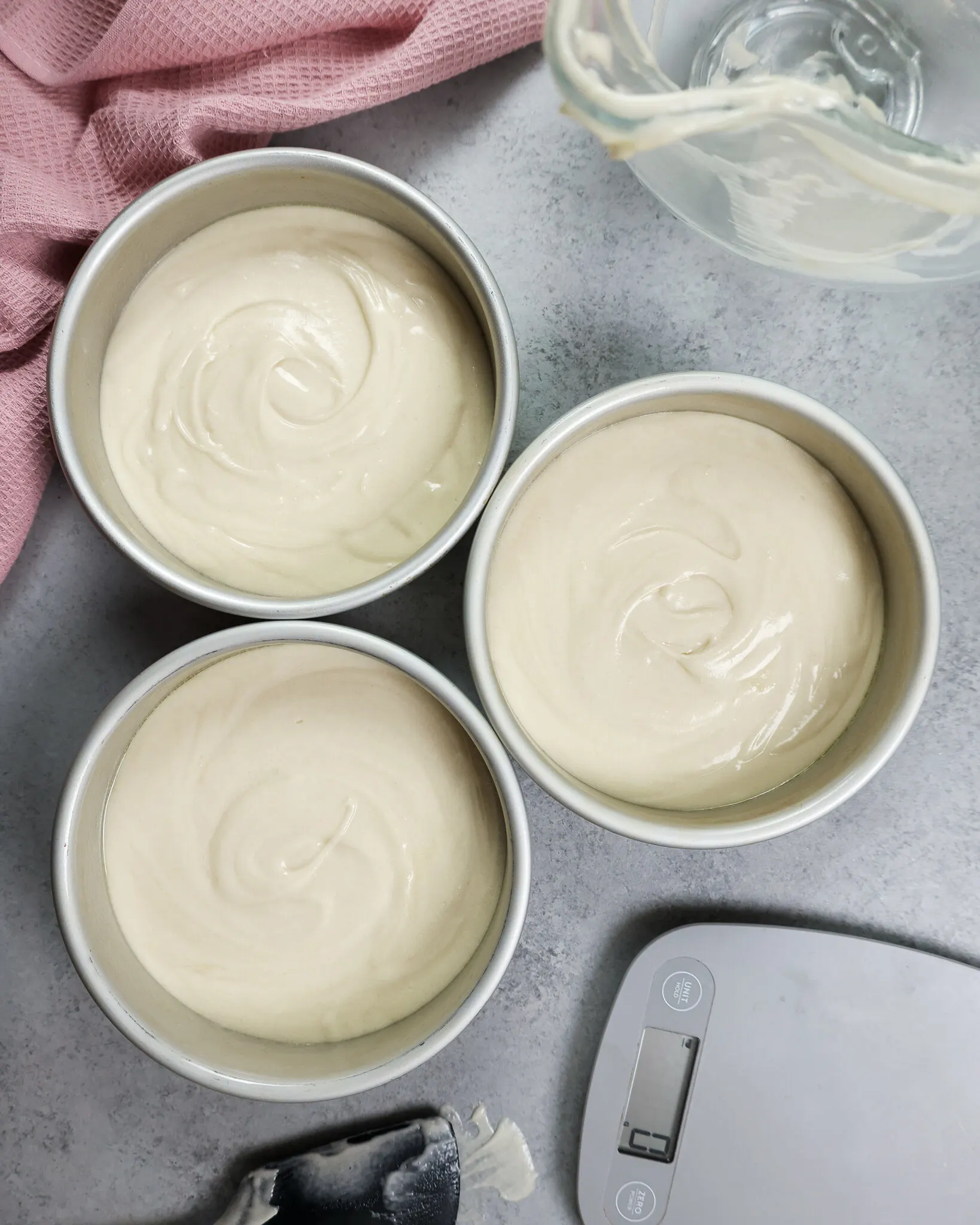
Substitutions and Swaps – Vanilla Buttercream Frosting
- Unsalted Butter – If you only have salted butter on hand, you can use it in place of the unsalted butter. Just be sure to omit the salt that this frosting recipe calls for. You can also use vegan butter in its place (and omit the salt)!
- Heavy Cream – Whole milk or alternative milk (soy, almond, oat) will work fine in this frosting recipe if that’s what you have on hand.
- Vanilla Extract – Other extracts can also be used in place of the vanilla extract. Feel free to use coconut extract, hazelnut extract, or even pistachio extract.
- Gel food coloring – If you want to color this frosting, I recommend using gel food coloring! It creates vibrant colors without throwing off the consistency of the buttercream.
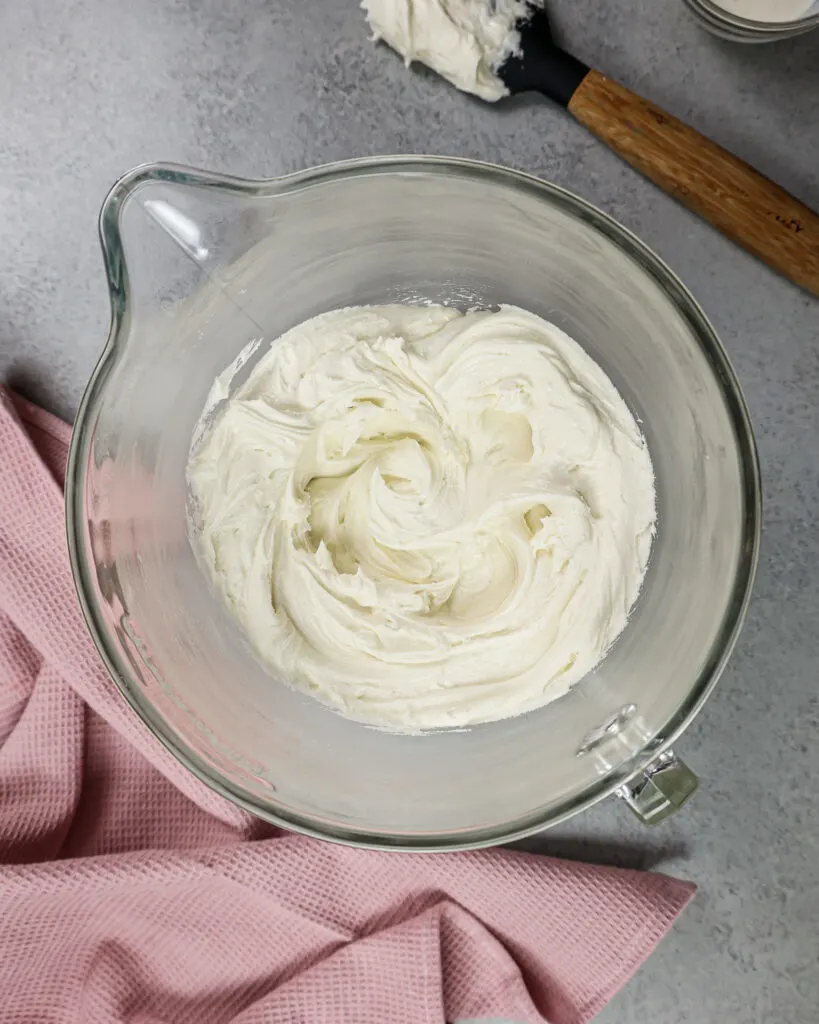
Tips for Making this Small Batch Vanilla Cake Recipe
- Chill your cake layers in the freezer for about 20 minutes before assembling the cake. It makes it easier to stack and frost.
- Properly measure your flour (spoon into the cup measure, then level) or use a kitchen scale to measure your dry ingredients.
- Use a serrated knife to level your cake layers once they’re fully cooled to make it easier to assemble and frost the cake.
- I do NOT recommend using this recipe to make cupcakes! Instead, I highly recommend trying my vanilla cupcake recipe (I like the texture better for cupcakes).
- Use my regular vanilla cake recipe to make a 7-inch or 8-inch layer cake.
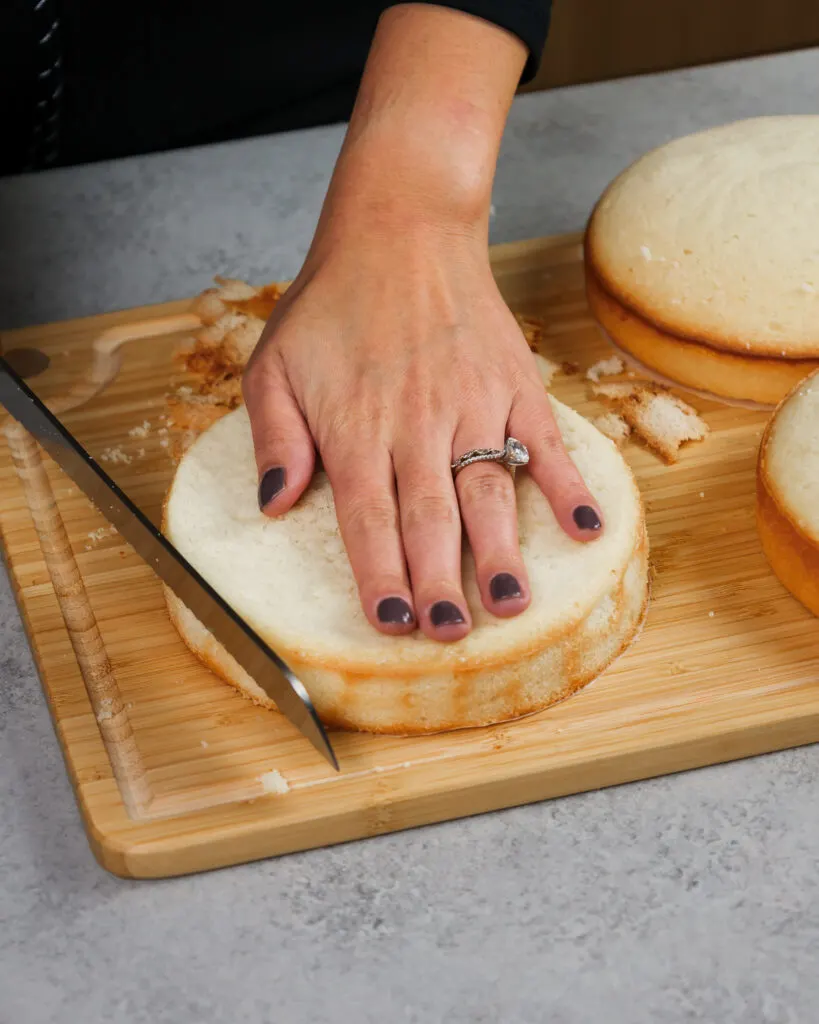
Making These 6-inch Cake Layers in Advance and Storage Tips
Make your cake layers in advance and freeze them. It breaks the process up and makes it more approachable.
Make your frosting ahead of time too or save any leftover frosting! It can be stored in an airtight container in the fridge for up to a month, or in the freezer for up to 3 months. Be sure to give it a good stir once it thaws to get the consistency nice and smooth again.
A frosted cake can last in the fridge for up to a week, or in the freezer for up to a month. The buttercream locks in all the moisture, keeping the cake fresh and delicious!
If you cut into the cake and have leftovers, use any remaining frosting to cover the cut section to keep it moist and store in the fridge for up to a week.
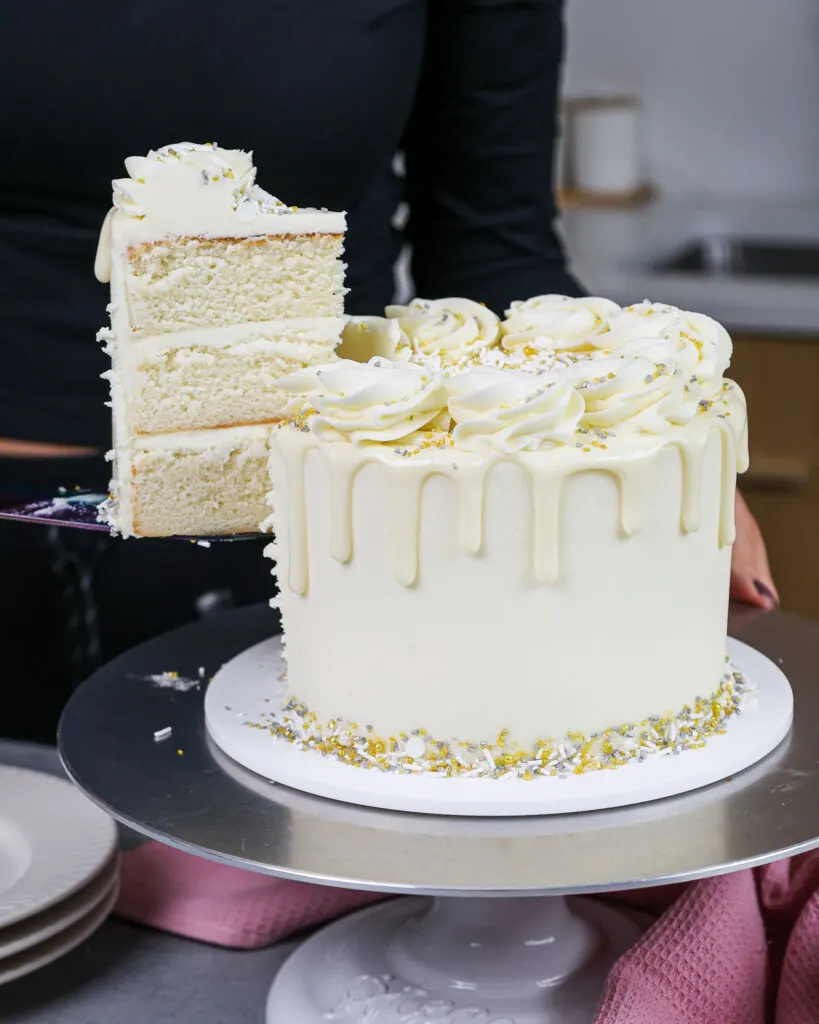
Let Me Know What You Think!
I’d love to hear your thoughts on this small batch cake recipe! Do you like to make smaller cakes like this?
If you try this small batch vanilla cake recipe, please tag me @chelsweets and #chelsweets so that I can see your amazing creations!
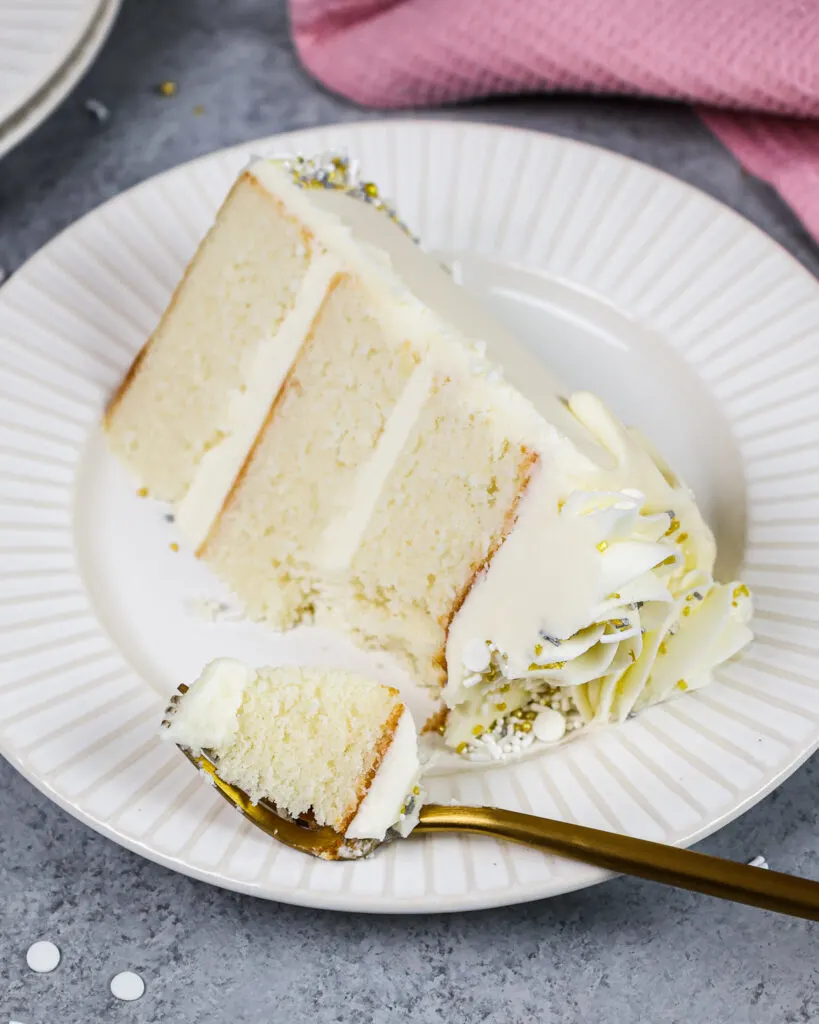
Other Recipes You Might Like:
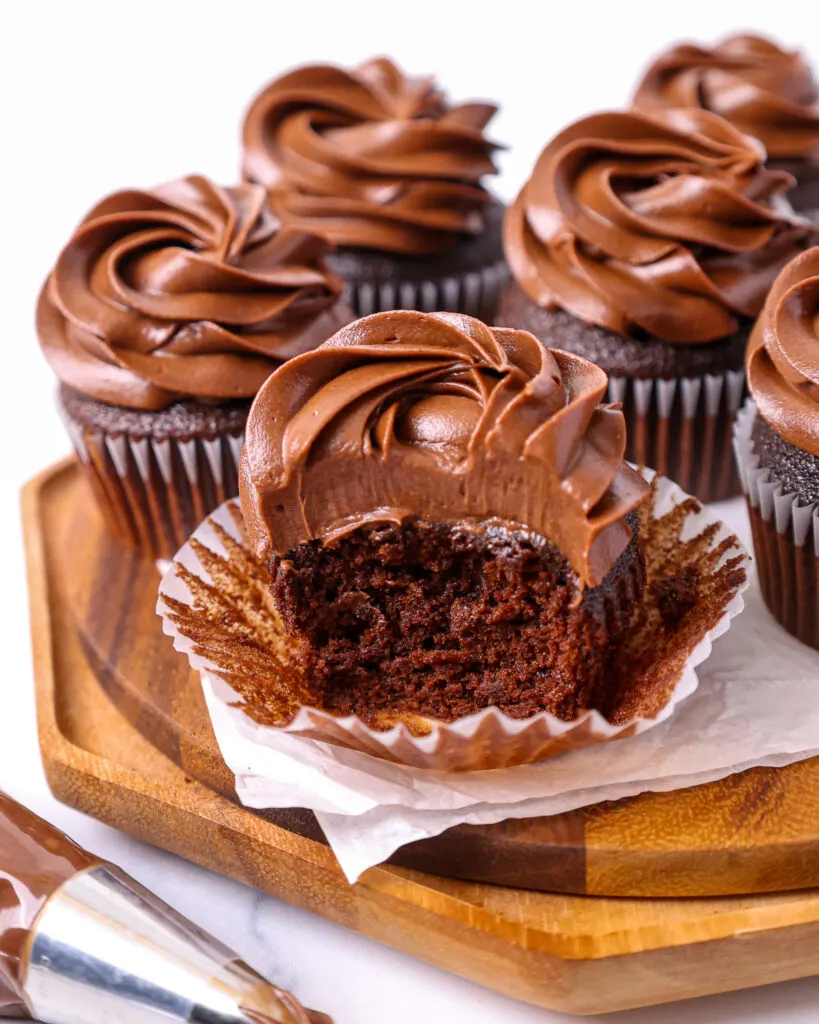
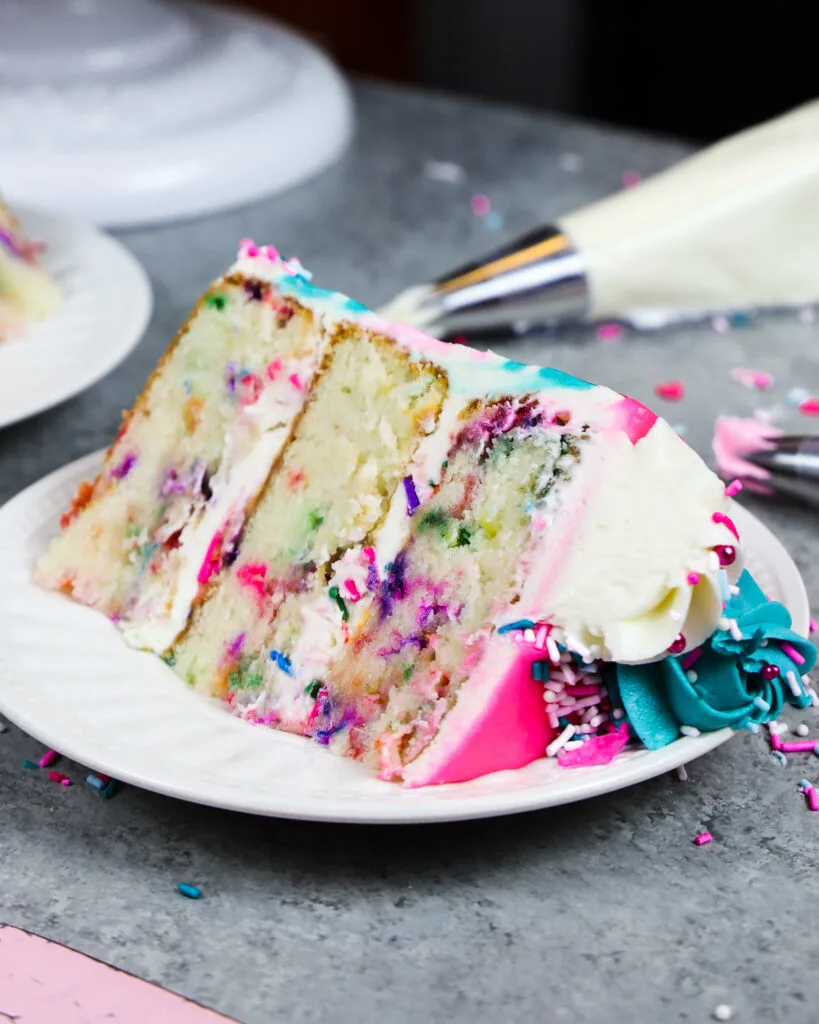
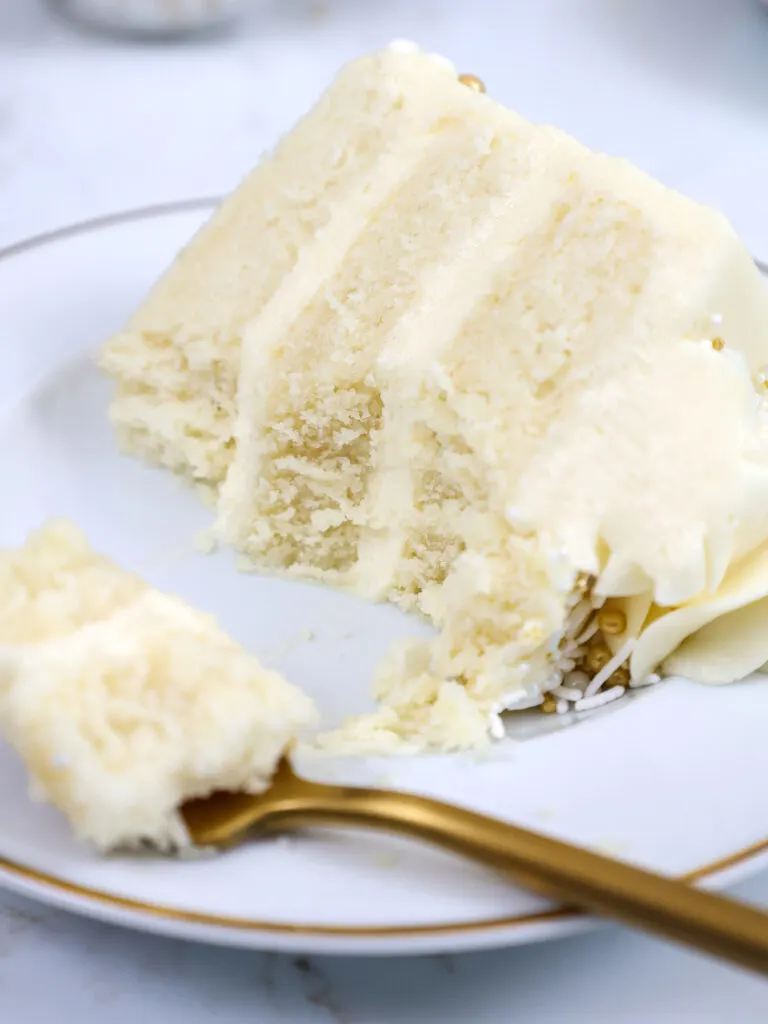
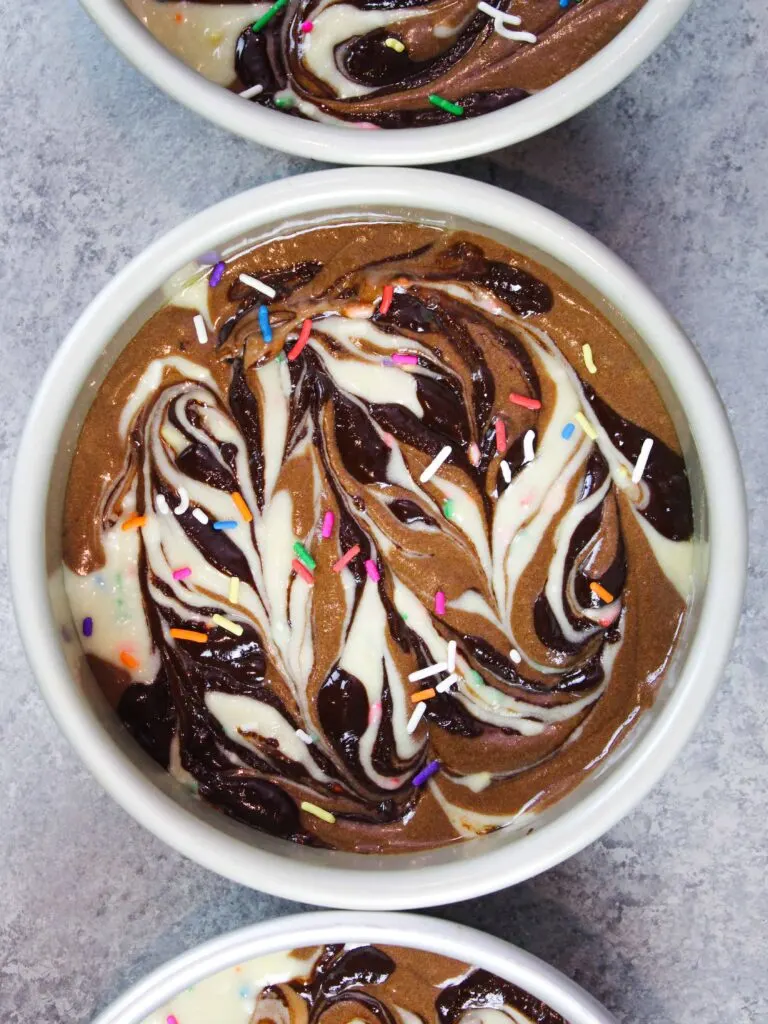
Small Batch Vanilla Layer Cake Recipe
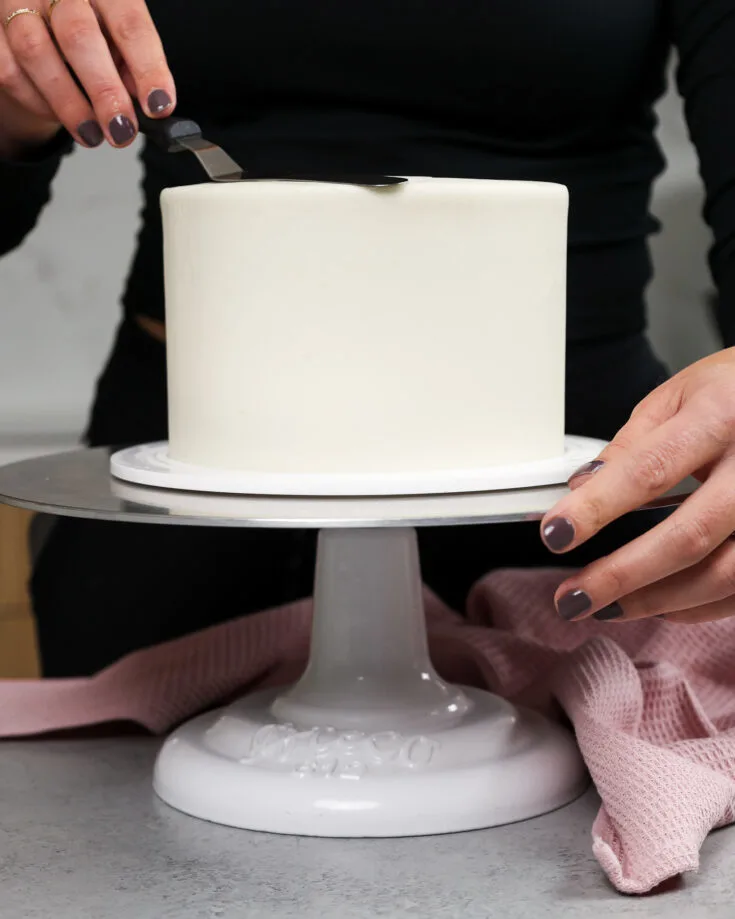
This vanilla layer cake recipe makes the perfect 6-inch layer cake! It makes three, moist cake layers that are perfect for stacking.
Ingredients
Vanilla Cake
- 2 cups + 2 Tbsp all-purpose flour (270g)
- 2 cups granulated sugar (400g)
- 1 1/2 tsp baking powder (6g)
- 1/2 tsp salt (3g)
- 2/3 cup or about 1 and 1/3 sticks unsalted butter, room temperature (150g)
- 2/3 cup egg whites or about 5 egg whites (155g)
- 1 cup buttermilk, room temperature (240g)
- 1 Tbsp vegetable oil (14g)
- 1 tsp vanilla extract (4g)
- gel food coloring (if desired)
Vanilla Buttercream Frosting
- 2 cups unsalted butter, room temperature (452g)
- 7 cups or a 2 lb. bag powdered sugar (907g)
- 2 Tbsp heavy cream or whipping cream (30g)
- 1 Tbsp vanilla extract or vanilla bean paste (12g)
- 1/2 tsp salt (3g)
Instructions
Vanilla Cake Layers:
- Preheat oven to 350°F. Line three 6-inch pans with parchment rounds, and grease with non-stick baking spray.
- Mix 2 cups + 2 Tbsp all-purpose flour, 2 cups granulated sugar, 1 1/2 tsp baking powder, and 1/2 tsp salt in a large bowl. Use a stand mixer with a paddle attachment or hand mixer to mix on a low speed until combined.
- Mix 2/3 cup (1 & 1/3 stick) unsalted butter slowly into the dry mix, on a medium-low speed. Continue to mix until no large chunks of butter remain, and the mixture becomes crumbly.
- Pour in 2/3 cup or about 5 egg whites and mix on low until just incorporated and the batter looks wet.
- Then mix in 1 cup of buttermilk, 1 Tbsp of vegetable oil, and 1 tsp vanilla extract on a low speed. Scrape the sides and bottom of the bowl as needed with a rubber spatula, then beat on a medium speed for about a minute to make sure everything is properly mixed together. This also helps lighten the texture of the cake layers a bit.
- If desired, add in gel food coloring and stir by hand with a rubber spatula until the batter is evenly colored.
- Divide batter evenly between the prepared cake pans. I like to use a digital kitchen scale to weigh my pans and ensure they all have the same amount of batter. This guarantees your layers will bake to the same height.
- Bake for 30-33 minutes, or until a toothpick comes out with a few moist crumbs. Allow the pans to cool for 10 minutes, then run a small offset spatula around the perimeter of the pan to separate the cake from the pan.
- Place cake layers into the freezer for 30 minutes to accelerate the cooling process. Once the layers are fully cooled, carefully flip the pans and remove the layers.
- Use a serrated knife to level the tops of the layers right before you plan to assemble your cake.
Vanilla Buttercream Frosting:
- While the cake layers bake and cool, make the vanilla buttercream frosting.
- Beat 2 cups of unsalted butter on medium speed for 30 seconds with a paddle attachment or hand mixer until smooth.
- Slowly mix in 7 cups of powdered sugar on a low speed, 1 cup at a time. Halfway through, add in 2 Tbsp of heavy cream or milk to make it easier to mix.
- Scrape the sides and bottom of the bowl as needed with a rubber spatula.
- Once the frosting is fully mixed and smooth, add in 1 Tbsp of vanilla extract and 1/2 tsp salt. Mix on the lowest speed for a couple of minutes to help make the frosting silky smooth.
- If the frosting seems too thick, add in additional cream (1 teaspoon at a time). If the frosting is too thin, add in more powdered sugar (a quarter of a cup at a time). If you're unsure how thick your frosting should be, you can learn what consistency you're looking for in my frosting consistency post.
- If you plan to color the buttercream, add in the gel food coloring once the frosting is fully made, and beat on low until it reaches the desired color.
To Assemble The Cake:
- Stack and frost cake layers on a greaseproof cake board, using a dab of frosting to help stick the first cake layer to the board.
- Spread an even layer of buttercream between each cake layer with a large offset spatula.
- Add a thin coat of frosting around the cake to fully cover the cake layers.
- Smooth using a bench scraper, then chill the cake in the fridge (20 minutes) or freezer (10 minutes) until the frosting is firm to the touch.
- Add a second, thicker layer of frosting to the cake, and smooth using a bench scraper. Then decorate as desired!
Notes
Tips for Making the Best 6-inch Layer Cake
- Properly measure your flour (spoon into the cup measure, then level) or use a kitchen scale.
- Make sure your ingredients are at room temperature to help them mix together better.
- Don't level and torte your cake layers until they are completely cooled.
- Make sure your buttercream is the right consistency. This will help give your cake proper structure and make it easier to decorate.
- If your cake layers turn out less than perfect, read my cake troubleshooting guide to see where things might've gone awry.
- Be sure to use heavy cream or heavy whipping cream to make the frosting! You need the high fat content to create the right consistency in this recipe. Milk cannot be used in place of the cream.
Making This Small-Batch Cake in Advance and Storage Tips
Make your cake layers in advance and freeze them. It breaks the process up and makes it more approachable.
Make your frosting ahead of time too or save any leftover frosting! It can be stored in an airtight container in the fridge for up to a month, or in the freezer for up to 3 months. Be sure to give it a good stir once it thaws to get the consistency nice and smooth again.
A frosted cake can last in the fridge for up to a week, or in the freezer for up to a month. The buttercream locks in all the moisture, keeping the cake fresh and delicious!
If you cut into the cake and have leftovers, use any remaining frosting to cover the cut section to keep it moist and store in the fridge for up to a week.
Nutrition Information
Yield
16Serving Size
1Amount Per Serving Calories 581Total Fat 27gSaturated Fat 17gTrans Fat 0gUnsaturated Fat 9gCholesterol 71mgSodium 260mgCarbohydrates 84gFiber 0gSugar 82gProtein 3g

Sanya
Monday 24th of June 2024
Hiii can you tell me how many cups of batter does small batch vanilla cake yield? Thanks!
Chelsweets
Saturday 29th of June 2024
Absolutely! This recipe makes about 6.5 cups of batter :) Hope that helps, happy baking!
Johanna
Saturday 15th of June 2024
Hi, when I made this cake batch earlier in three 21cm springform pans for 35min, it turned out perfect. When I made the same batch in three 15cm different pans for 35min, they look great on the outside, but on the inside, they were not done, or I dont really know, the toothpicks were not sticky at all, but they look "wet" in the middle, and when you "squeeze" them, it is like they are "wet"? I don't know what I've done wrong? should they have been longer in the oven and lower temperature?
Johanna
Chelsweets
Saturday 15th of June 2024
Hi Johanna,
Is it just that the top of layers are kind of sticky? When you cut into the layers, what is the texture like? Also - what type of pans (light vs. dark metal, aluminum, etc.)? Hopefully we'll be able to figure out what happened!
Johanna
Saturday 15th of June 2024
Sorry, I meant in two 21cm springform pans..
Ree
Friday 7th of June 2024
Hi Chelsea, what if I was to use this recipe to make an eggless cake? Any recommendations?
Chelsweets
Sunday 9th of June 2024
Hi Ree,
Great question! I'd suggest swapping out the egg whites in this recipe for 2/3 cup of unsweetened applesauce plus an extra 1/2 tsp of baking powder. I prefer using applesauce, but you can also use 3 flaxseed eggs or a vegan egg replacer. Hope that helps, happy baking!
Angie F.
Thursday 11th of April 2024
Question, probably something I’m doing but after I baked my layers for about 30 minutes they look nice and tall and golden brown on top. I took them out and let them cool. Then when I removed the layer it looked not quite cooked enough on the bottom. Could it be my pans or that I used cake insulated wraps around my pans? I wrapped them with foil and put them back in for a bit longer. Any suggestions?
Chelsweets
Saturday 13th of April 2024
Hi Angie,
It's hard to be able to tell without being able to see the layers, and sadly we aren't able to upload pictures in the comments section on here :/ It's rare that the bottom of a cake layer doesn't get fully baked if the top does unless your oven runs warm or has a lot of hot spots, but it possible. It could be the pans you're using, are they aluminum / light in color?
This recipe bakes pretty flat so you shouldn't really need to wrap the pans in foil. I don't think that would have cause any issues, but maybe try it without the foil and see if that helps too! Hopefully it will, but if it doesn't let me know and we'll try to keep trouble shooting together <3
Dulmini
Thursday 7th of March 2024
Hi Chelsea,
I'm searching for a vanilla cake recipe for my son's 3rd birthday. And he loves Bumble bees. Can I use this vanilla cake recipe to do the Bumble Bee cake you have? How would I scale up this recipe to make 4 x 6-inch layers of cake instead of 3 to make the bumble bee cake?
Thank you,
Chelsweets
Sunday 10th of March 2024
Hi Dulmini,
Great question, you totally can! I'd actually recommend using my standard vanilla cake recipe, which can be used to make 4, 6" cake layers (bake time will be a few minutes longer than the recipe calls for). Here's the link: https://chelsweets.com/best-vanilla-layer-cake-recipe/
Hope that helps, happy baking!